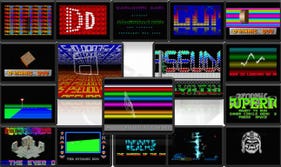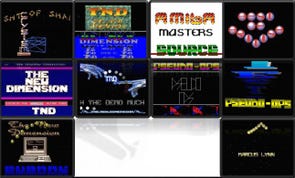Control Less, Do More
Programming leads tend to be control freaks, although it's a good trait in one aspect is it always in our best interest ?

Control Less, Do More
I’ve been a professional game developer for a while, well for a long while to be honest, and when not officially in the games biz I’ve been on the demo-scene. On the Atari ST we were under the cunning name of The Dynamic Duo, writing demo-screens but also slipping in the odd game here and there, while my partner in crime, HiTech, (we had the coolest names!?), was writing cool bootloaders and fantastic demo screens I was sometimes writing games to add to our latest mega-demo discs on the ST, even on the Amiga as part of the Pseudo Ops demo group I spent more time on games than demos.


Some of our demos of yesteryear !
I started on computers sometime back in the early 80s and one of the first biggish games I wrote, for myself, was Back To The Future, I spent months on it, it was a graphical adventure and in one swoop I deleted the whole lot using an incorrect Commodore 128 disk Open command, since then I, like many others, have loved writing games.
But as I continued to move between different platforms and writing more and more games & demos, finally breaking into the games industry in 1995 with a 100% assembler game, my collection of routines, code snippets and projects slowly metamorphosised into one development system.

My demo game, Assault, written to help me break into the games industry.
It was not long after finishing Subculture at Guildford based Criterion Studios that I started to create a ‘super’ game editor, not that the editor itself was super in anyway, definitely not at that time, but this referred to a notion of something that encapsulated the game and where the game logic & asset were treated as an asset, so the game essentially was a subset of the editor.
The important thing for me at this point was reuse and iteration, being able to run the game in the editor as well as standalone, and so was born G.E.D.I., (or Vamped as it was originally known after a game design created by myself & a fellow gamedev at Criterion), the G.E.D.I. name itself was a contrived set of letters standing for Game Editor Development Initiative, but obviously because it sounded like Jedi I just retrofitted the words to the letters :-)

One of the very first iterations of G.E.D.I. in 1997 , or VampEd as I also called it.
Throughout the years G.E.D.I. grew, all my home projects were now created in G.E.D.I., and any new technology I wrote was retrofitted into G.E.D.I. to make it reusable, G.E.D.I. was used, under license from me, in a commercial title and G.E.D.I. went from strength to strength growing ever more powerful.
A few years later I started at Lionhead, and moved up through the ranks until I attained the glorified, but rather dull, role of Technical Director, an almost hands off role consisting of meetings, technical strategy, due diligence and team management. One of the decisions I fought the Lionhead board on at the time was Lionhead’s obsession with writing the engine/editor/tool-chain as well as the game ourselves, this worked in the earlier days with Black & White and The Movies, but as the studio moved through different iterations of the Fable Franchise it became more and more painful to see the result of this strategy.
I was given the opportunity to review different technologies for a new project we were starting, namely Fable : The Journey, as technical director I had to ensure I removed as much risk as possible from the project, one major risk to me was the in-house technology. Initially I was told that I could look at different technology solutions, but we’d still use the in-house tech, for me that was a completely pointless exercise, so approached it from the angle of getting non-engineering disciplines on board.
The non-engineering disciplines at Lionhead suffered the most in my eyes, I clearly remember a situation where a prison cart in Fable II was clearly lopsided, so, just out of interest, I spoke to one of the level designers about the problem, which they knew all about but reeled away from changing it, their reason being that it was too painful, with an asset build that took too long with the chance it could break anything, to risk touching it, and it seemed at that very point the light of willingness, creativity and passion slowly withered away in their eyes.
So, to me it was all about the tools, getting a robust toolchain, with a world class engine that we won’t be spending years on before anyone gets to see anything pretty, and that’s where the investigation into a 3rd party engine started, and once the non-engineering disciplines got their hands on this, and became aware this could happen, at Lionhead, there was no turning back and we turned out one of the prettiest games Lionhead had ever made at that time.

Fable : The Journey, our first Lionhead game made with a middleware engine.
From there onwards we became a studio that created games, not engines, although there’s has been some significant engine work done by Lionhead in the middleware we choose, we still made the right choice.
I had changed the direction of a company, not everyone agreed, we lost some exceptionally smart people because of it, but sometimes you have to see the bigger picture, what exactly are you trying to do ?, what are you trying to create ?, what is your goal ?, what is your passion ?
But for me personally, on my home projects, the question still existed, if Lionhead made this change to focus on what they want to do and were good at, why was I still knee deep in technology ? Roll on a few years forward, G.E.D.I. has now gone from a software rasterised graphics engine with a rather simple ‘super’ editor to an all-encompassing solution supporting DX8,DX9,DX11,PC,Xbox360 & XboxOne and features covering advanced play-in-editor dev environment, forward/deferred rendering, a custom physics engine, reflection system, visual scripting system, pathfinding, audio system, VR support and the list goes on

https://www.youtube.com/watch?v=cwX-3diz0t0
The answer, however hard it is to admit, is that I’m a control freak, I want to control everything, I like to know where every byte goes, where every cycle goes, when I start personal game projects I have a great base to start from, but if I need tech, I might spend a little time looking for middleware or open source solutions, but then fall back into the same trap of ‘I can write it better myself’, so inevitably end up with a half-finished project but some great tech.
I’ve been fortunate to have worked on a ton of great games at work, but at home I have a graveyard of projects, albeit finished at least to a polished point, but not finished, because I felt I could never trust other tech.

A selection of some of the commercially released games and personal half-finished game demos I've worked on.
So, where am I now?, now I’m somewhere different, originally when starting Fable Fortune, our current project at Flaming Fowl Studios, which we previously started at Lionhead, I started down the old familiar safe and secure route of ‘let me just quickly add proper transparency support to my deferred engine and then we’re good to go’, but knowing that we didn’t have the resource in house we choose a partner to work with, and that partner had experience with Unity.
Unity wasn’t something I took seriously at the time, but as I spent more and more time working with our partner and then using Unity as our preferred incubation engine at Lionhead Studios, I began to change, I started to enjoy using middleware, I started to enjoy doing the very thing I had started VampEd for nearly 20 years ago, I was writing games again.

Fable Fortune running in Unity
https://www.youtube.com/watch?v=8DJDMJitk5Y
Once Lionhead had closed its doors for good and we started Flaming Fowl Studios, I decided that I should just ‘try’ to see if I can work exclusively in Unity at home too, it was hard, really, really hard, and I don’t mean, ‘how does this friggin thing work’ hard, but, ‘Arghh! I could just write this myself’' hard.
It’s a mind-set change but right now I don’t regret it at all, and in fact I love it (not all of it mind you, but a hell of a lot of it). I think I finally found tech I can trust, and have enough control to handle when things don’t quite work as I'd like, I'm still concerned about the bytes and the cycles, but I'm not obsessed by them, I'm not any less of an engineer because I'm not writing the engine too, I'm focusing on what's important, the game.
I think I've finally learnt to Control Less and Do More.
Read more about:
BlogsAbout the Author(s)
You May Also Like













